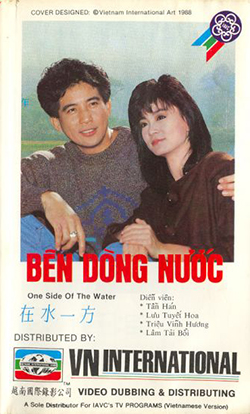
Chiung Yao or Qiong Yao is the pen name of Chen Che, a Taiwanese writer and producer who is often regarded as the most popular romance novelist in the Chinese-speaking world. Her novels have been adapted into more than 100 films and TV dramas.
Ceremonies of the 19th Golden Melody Awards were held in Taipei, Taiwan in 2008. Nominees were announced on May 22, 2008, and the award winners in 12 traditional music categories and 23 popular music categories were selected by a panel of 33 judges after four rounds of jury meetings. Initially, there were 10,632 submissions from 185 companies in the music industry, making it the largest submission pool in the Awards' history.

The Silent Wife is a 1965 Taiwanese drama film directed by Li Hsing, based on Chiung Yao's 1964 novelette.

Li Hsing or Lee Hsing (李行) is a Taiwanese film director. He was born Lee Tz-da (李子達) in 1930 in Shanghai and died in 2021. He made one of the early popular Taiwanese films in the late 1959, Wang and Liu Tour Taiwan (王哥柳哥遊台灣), though he did not speak Taiwanese. He was also the key director in the promotion of Healthy Realist film (健康寫實片) and Literary Romantic film (愛情文藝片). He was awarded the best director at Golden Horse Awards three times and had seven films awarded the best feature film: Beautiful Duckling, The Road, Execution in Autumn, Land of the Undaunted,, He Never Gives Up, The Story of a Small Town, and Good Morning, Taipei. After he made his last film The Heroic Pioneers, he vowed to be the lifetime volunteer for the promotion of development of Taiwan cinema. In 2009 he established the Cross-Strait Films Exchange Committee, which has been the main, if not only, organization promoting the interaction and cooperation of Taiwanese and Chinese filmmakers. Lee Hsing is often referred to as the “godfather of Taiwan cinema” for his great contribution to Taiwan cinema.

Eight Thousand Li of Cloud and Moon is a Taiwanese television series based on the life of Yue Fei, a Song dynasty general widely regarded as a patriot and national hero in Chinese culture for his role in the Jurchen campaigns against the Song dynasty. The Chinese title of the series comes from a line in Man Jiang Hong, a patriotic poem commonly attributed to Yue Fei. The series was first aired on CTS in Taiwan from 21 November 1988 to 13 January 1989.

The Unforgettable Character is a 1975 Taiwanese romantic drama film directed by Chang Mei-chun and written by Chiung Yao.

Apple in Your Eye is a 2014 Taiwanese television series. The series was produced by Qinai Studio Ltd. It stars Lan Cheng-lung, Amber An, Christina Mok and An He as the main leads. It was first aired on August 8, 2014 on TTV Main Channel after Prince William and last aired on November 7, 2014.

Be With You is a 2015 Taiwanese romance, family drama television series produced by Sanlih E-Television, starring Bobby Dou, Huang Pei Jia, Nylon Chen, and Vivi Lee as the main cast. The Chinese title literally translates to "Want To Love". Filming began on March 18, 2015 and will be filmed as it airs. First original broadcast began April 14, 2015 on SETTV channel airing weekly from Monday till Friday at 8:00-9:00 pm.

Love or Spend is a 2015 Taiwanese television series starring Kingone Wang, Ling Hung, Jolin Chien, Dayuan Lin and Li Jing Tian. Shooting began on October 23, 2015, and wrapped up on February 22, 2016. The original broadcast began on November 4, 2015, on SETTV, airing weekdays at 8:00 pm.

The Love Song is a 2016 Taiwanese romance, television series starring Miao Ke-li, Lu Hsueh-Feng, Vivi Lee, Darren Chiu, Tracy Chou, Sean Lee, Steven Sun and Julie Ting. Shooting began on January 15, 2016 and episodes aired as soon as the shoot finished. The original broadcast began on February 24, 2016 on SET Metro, airing weekdays at 8:00 pm.

One Side of the Water is a 1988 Taiwanese television drama series produced by Ping Hsin-tao, based on the 1975 film The Unforgettable Character and its associated 1976 novel, both written by his wife Chiung Yao. The series stars Chiung Yao regulars Chin Han and Leanne Liu in the leading roles.

Deep Garden is a 1987 Taiwanese mystery TV drama series based on romance novelist Chiung Yao's 1969 novel. The series was produced by Chiung Yao's husband Ping Hsin-tao and first shown on Chinese Television System. The title is taken from an 11th-century poem by Ouyang Xiu, which happens to be the favorite line of the mysterious female protagonist.

Wan-chun is a 1990 Taiwanese television series produced by Ping Hsin-tao and his company Yi Ren Communications Co. (怡人傳播公司) in conjunction with Chinese Television System, based on Chiung Yao's 1964 novellette Wan-chun's Three Loves, which is set in Republican era Beijing.
Wan-chun's Three Loves is a 1964 Taiwanese novelette by Chiung Yao. It was translated to English in 1965 by Tommy Lee.

Mute Wife is a 1990 Taiwanese television drama series based on Chiung Yao's 1965 novelette of the same name. The drama stars Leanne Liu in the title role.

Chinese Taipei competed at the 1994 Asian Games in Hiroshima, Japan. This was their 6th appearance in the Asian Games. They won at total of 7 gold, 13 silver, and 24 bronze medals, or 44 medals in total. They improved from the previous Asian Games in 1990, where they won a total of 31 medals. They won the most medals in Judo, where they got a total of 1 silver and 5 bronze.

My Cape of Many Dreams is a 1981 Taiwanese romance drama film directed by Liu Li-li, based on Chiung Yao's 1979 novel.
Dream of the Red Chamber is a Taiwanese TV series based on Cao Xueqin's acclaimed 18th-century novel of the same name. Filmed mostly in Shanghai, the TV series was first broadcast on Chinese Television System from November 1996 to October 1997.
Kong Hong, also known as Henry Kung, was a Taiwanese film producer and writer.















